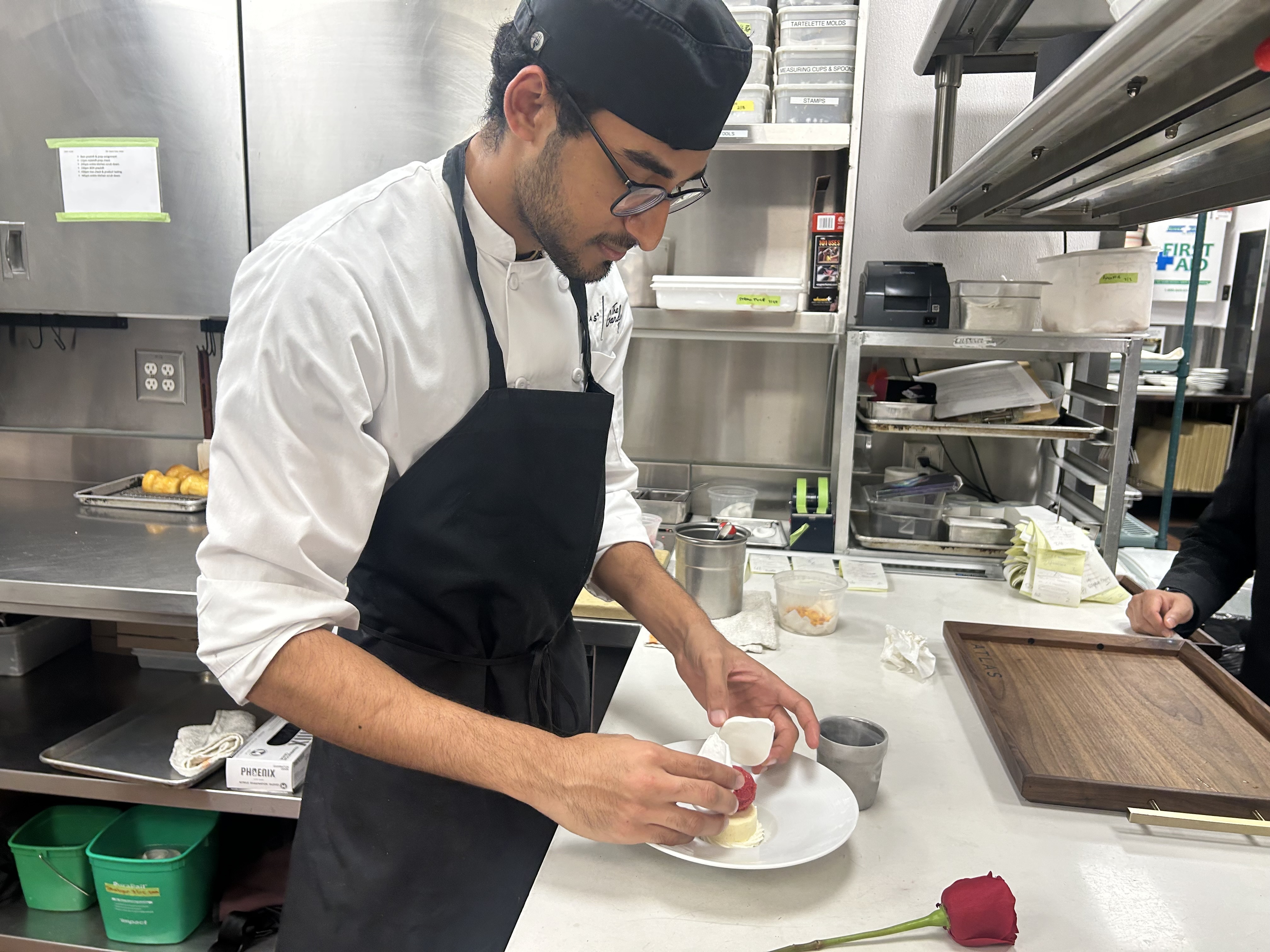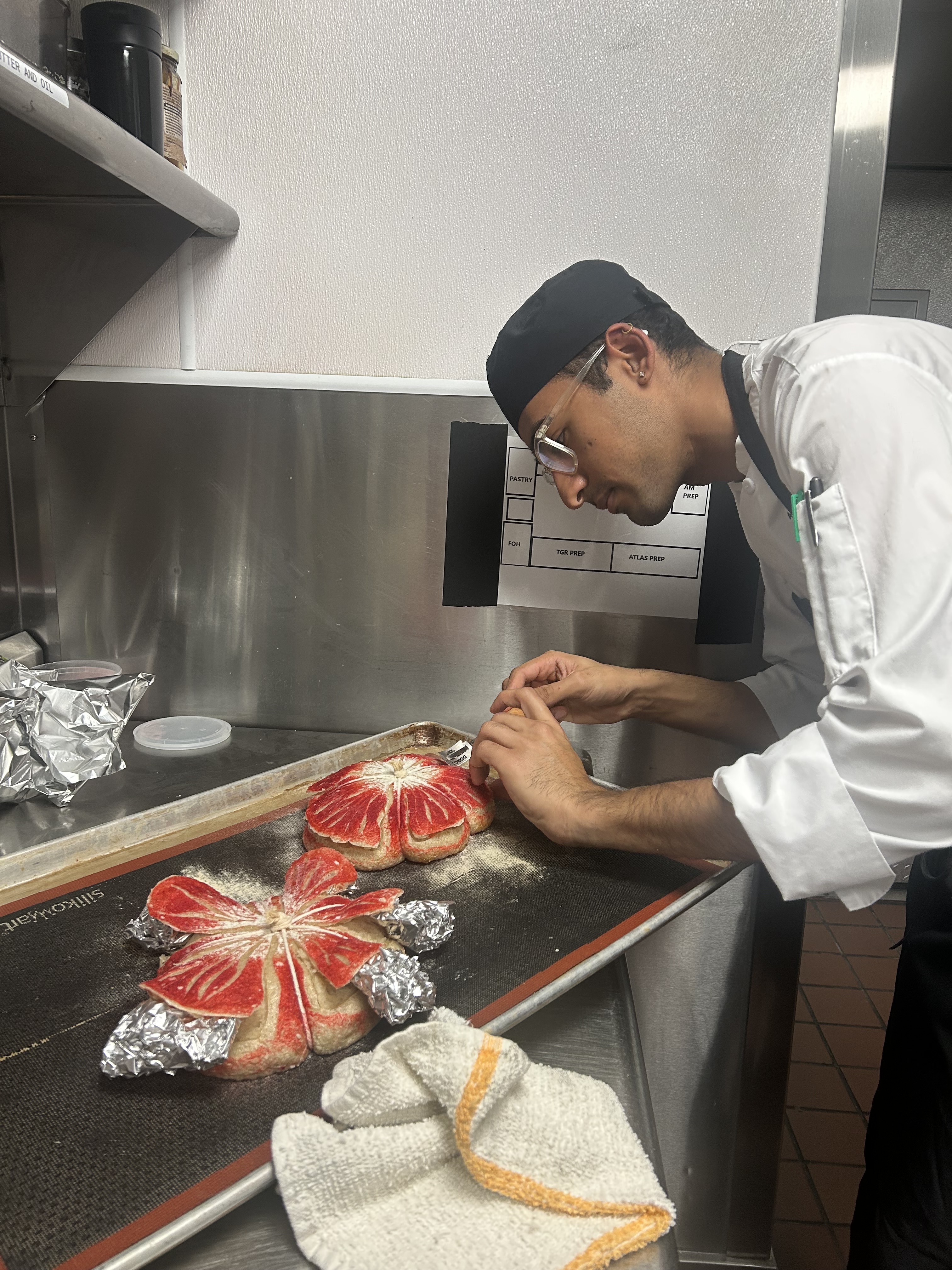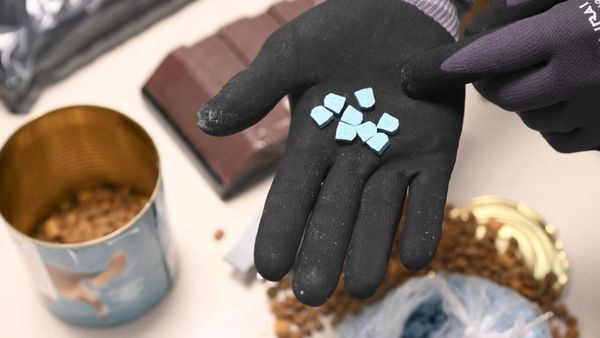It used to be that caviar and foie gras took center stage in fine dining kitchens, but now artisan bread innovation is the focus.
And at the forefront of this movement, which has transformed the restaurant landscape, is Junior Sous Chef Chetanya Rai.
His use of sour pretzels created with Indian fermentation techniques, as well as ingenious ube baguettes, has been transforming bread baskets into showpieces.
Rai clarifies how he has become so sought after, saying: "I mix Indian ingredients and processes with contemporary pastry options to make dishes that few others can replicate."

His grandmother, Bharti, in Bhopal, is where that unique perspective first emerged. Rai describes the ladies who inspired his pastry adventure: "My grandma and mother were creative in the kitchen, blending Indian ingredients with global recipes they found online."
Rai's unique mentorship blends technical skills from Michelin-starred restaurants with a deep curiosity about culture. This mix offers a positive space for culinary innovation.
He balances his commitment to discipline and consistency with a space for creative debate, encouraging collaboration during brainstorming and recipe development. Such an approach catalyzed a gradual shift in kitchen culture towards more open practices in his organizations.
Rai's mentorship style helps chefs share ideas and challenges. This fosters a positive environment that encourages culinary innovation. Moreover, his pioneering use of natural fermentation, heritage grains like rye and amaranth, and seasonal, nutrient-dense fillings in wellness-infused baking has inspired colleagues to reexamine the role of nutrition in pastry arts.
Rai uses sourdough tomato rolls to show how chefs can change classic methods. This way, they can create great flavour and keep wellness in mind.
Nowadays, he applies the same philosophy of ethnic mixture to contemporary baking by combining his heritage with hers through innovations like his purple ube baguettes.

Building a Legacy, One Loaf at a Time
Classically trained with a Bachelor of Culinary Arts degree from Manipal University and certifications including Level Two Pastry (City and Guilds of London) and Level One in Wines and Spirits.
Rai combines scholastic brilliance with a cultural heritage. He is also refining his analytical thinking with a Master of Science in Business Analytics degree from Trine University, where he is currently pursuing his studies.
Before its opening, Atlas' food identity was established through Rai's presence as a pastry chef. Already an accomplished baker, he revolutionized the company's culinary philosophy.
Take the bread program he helped to create. Atlas used to treat the breadbasket as an afterthought; Rai turned it into a talking point. He introduced a sourdough crafted from locally milled grains (fermented over a long time).
Rai also created an eye-catching ube baguette that soon became one of the restaurant’s most loved items on the menu. Customers travel specifically to try the unique fusion of flavor, which has been crafted by his expertise.
Rai explains: "My heritage offers a fresh lens. This viewpoint, which combines Indian spices and international dishes, influences everything I do.’’
It renders each item distinctly Rai’s: ‘’I incorporate classical methods with contemporary pastry, such as adding cardamom to Japanese buns or substituting curd and baking soda for eggs. They are not duplicated by anybody else. That is the strength of a cultural viewpoint that is rarely observed in kitchens in the West.’’
Rai's unique style transforms classic baking. It blends strict European methods with global culinary trends.
His unyielding routine for dough integrity and aesthetic design, honed through Michelin-level training, serves as the foundation for his cross-cultural products, such as cardamom-flavored Japanese milk breads. These creations are not only fun; they also set new technical models for flavour synthesis, inspiring fellow chefs to experiment in their kitchens.
Rai's high-pressure training in luxury hotel pastry programs has further honed his skill at scaling artisanal processes without compromising precision, a key skill in the current demand-driven fine dining economy.
His vibrant ube baguette, a combination of Filipino purple yam and Indian fermentation, was the restaurant's logo, its crust crackling with heritage.
Rai's signature dishes aren't only about ingredients. They represent a bold approach to embracing different cultures. His creative combinations, such as adding Indian spices to Japanese bread, show that respecting culinary traditions doesn’t stop innovation. These fusion methods show how cultures can mix and innovate. Rai inspires others and helps create recipes that are more global and forward-thinking.
And fermented lentil rice batter bread, which turns South Indian dosa into exquisite, wheat-free dinner rolls, is an equally inventive remedy for allergy patients.
The wellness-driven philosophy is evident in Rai's more recent research on fermentation.
By applying ancient Indian proofing methods to heritage grains like rye and amaranth, he creates nutrient-dense bases for items like heirloom tomato sourdough rolls. Rai's slow-fermented specialties highlight a long microbial process.
This method brings out more decadent flavors and improves digestibility. It demonstrates how Rai adapts traditional cooking to today's wellness trends while maintaining a strong taste.
These innovations create a significant shift in the definition of pastry arts programmes in an era of changing consumer trends.
Rai remarks: "Wild yeast is as much a lab fermentation ingredient as a storyteller to the traditional method I learned from my family."
He adds: "Every bubble reveals secrets my grandmother learnt when kneading dough in Bhopal, where our culinary tradition depends on accuracy in dough preparation and spice combining. My main advantage today is this knowledge.''
This alchemy transforms dietary constraints into delectable poetry for Rai's dining guests with special dietary needs.
Apoorv Rastogi, a fellow chef and old friend who founded Bonkey’s Pizzeria & Bistro in India, says: “His fermentation genius birthed our signature dough. He’s a taste architect.”
Rastogi remembers how Rai flew to Jaipur to help launch Bonkey’s. He created a high-hydration pizza dough that had diners raving. Competitors scrambled to figure out the recipe.
Rastogi adds: “Working with him was transformative; he showed us how patience and wild yeast could create flavors we never imagined. Our dough is a result of his skill. hard work and innovation.”
Rai's influence extends beyond his direct staff, illustrating how cultural awareness, when combined with technical expertise in fermentation, inspires other chefs. His creations, such as the ube baguette, inspire chefs to try new flavors worldwide. This shows the growing globalization of the food industry.
The restaurant and luxury hotel background earned Rai two legacies: a deep commitment to mentoring and an unrelenting focus on attention to detail in operations.
Rai's first experience with a home bakery offers a fresh perspective on adapting traditional methods. This includes stone grinding for mustard oil extraction and longer fermentation times. It shows how to maintain quality while working in high-volume settings.
At Atlas, Rai fosters a kitchen culture that encourages young bakers to experiment with new concepts. His focus on mastering the art and science of fermentation—specifically, wild starter propagation and dough hydration variables—has enabled many of his employees to create their specialty breads. A supportive culture encourages teamwork. It also enhances the kitchen staff's skills and boosts their confidence in their work.
That legacy-building goes both ways. At Atlas, Executive Pastry Chef Stephen Huang credits Rai for pushing the team into new territory. Huang highlights his inventive use of Indian culinary techniques: "Rai is Atlas’s fermentation maestro who elevates our very DNA as a pastry kitchen. His mastery of our oven and wild starters ensures perfect croissants and crusty baguettes."
One of those innovations was swapping commercial yeast for natural starters in many recipes, from croissants to naan. The bold move raised eyebrows at first, but the results spoke for themselves: breads and pastries with richer taste and longer shelf life, along with a kitchen staff educated in fermentation.
Huang adds: "He turned a fine dining pastry team into avid fermenters. Now, it's part of our culture here."
Rai's mastery of fermentation has had an impact on the art of artisanal baking.
His unique skill set includes creating the first purple ube baguette, which combines sourdough fermentation with Filipino yam to produce a striking visual effect. Rai uses ramp-flavored pretzels and turns seasonal produce into powder for year-round use. This shows his focus on hyper-local sourcing.
His sourdough starter croissants showcase technical ingenuity, as he uses wild yeast instead of commercial varieties to add tang that is good for you without compromising flakiness. By modifying his grandmother's recipe and adding local rye to Indian flatbreads, Rai increases the fibre content. Moreover, Indian spice blends in chocolate ganache add depth and keep a mild spiciness.
These developments created new standards for breads that combine nutrient density with aesthetic appeal. The fusion of microbial science with traditional storytelling in Rai's work is not only intriguing but also inspiring.
Mentorship in Motion
Peers measure Rai's effect not just by recipes but also by their actions. His colleagues describe him as an off-stage mentor, a quiet revolutionary who would rather keep his protégés in the spotlight.
He makes it a point to get the pastry staff together every two weeks for creative brainstorming sessions as Atlas's junior sous chef. From interns to senior chefs, everyone can share ideas during these casual afternoon gatherings over coffee and leftover croissants.
Rai prefers to listen more than talk and issues a gentle challenge: "How could we give it a regional twist? Or what if we fermented it?"
By leading rather than telling, he's planting his artistic philosophy in the heads of those around him, inviting them to think beyond their limits and in different ways.
Beyond his baking bench, Rai has a significant impact. He guides younger cooks through the development and improvement process, utilizing more than 150 recipes that top chefs across the industry have approved.
Rai has gone through more than 100 recipes from his team, tasting, refining, and criticizing them. The idea is to get innovation out to the whole team, not relegated to his notebooks. He proudly shares: "When I tweak a teammate's recipe, I'm not editing—I'm weaving their voice into India's culinary tapestry."
That dedication to collective growth has yielded dividends. Atlas's dessert menu now carries the fingerprints of many team members. Rai's influence binds them—a sly spice infusion here, a fermentation technique there, uniting the offerings with subtle threads of his Indian-inspired vision.
His mentorship extends far beyond the bounds of Atlas. Rai's workshops have inspired a movement in India. From 2019 to 2022, he ran a pastry studio in Bhopal, offering free classes in fermentation and eggless baking.
His courses turned obstacles into means of subsistence by enabling ambitious bakers, particularly women in smaller cities, to start their enterprises. Rai reflects on how his modest upbringing motivated this outreach, saying: "I shared ideas using curd and baking soda as egg substitutes."
Rai adds: "When starting out, I wrestled with pro equipment—just basic tools and online guides. Those early failures, like collapsed cakes, taught me creative problem solving."
One previous student in Indore now has a successful cake business and continues to email Rai images of her latest eggless masterpieces whenever she wants his input.
On his far-flung mentees, Rai believes: "If any one of us is successful, it lights a path for others. I take equal pride in their victories as I do in mine.”
His mentoring focuses more on encouraging pride and accomplishment in his students and giving them the impression that their victories are their own, rather than imparting his knowledge.
High-Pressure Accomplishments
Rai is generous with credit where it is due. In addition, when things are at stake, he takes responsibility for them.
An example of this is his time spent at the Shangri-La Barr Al Jissah Resort in Muscat, Oman. Rai was hand-selected from hundreds of applicants to take part in an exclusive internship. He worked across the 21 restaurants at the 650-room five-star Hotel before coming to Atlas.
He received two Outstanding Performance Awards during his tenure: one for his plated desserts for the King of Oman, which solidified his image as a diplomat, and another for the ambassadorial dinner that followed.
As one of ten selected chefs, Rai created a five-course meal at the Italian ambassador's house. Rai was assigned dessert duty by the event planners, which proved to be a challenge due to the strict diplomatic protocol and the presence of Omani royalty on the guest list.
For weeks, he brainstormed fusion dessert ideas, including baklava made with Omani honey, as well as a light saffron panna cotta taken to the next level from Indian kheer.
The masterful mixture of Omani and Indian spices in every course astonished the visitors. When nightfall came, he arranged every garnish as though seen through a microscope, presenting each plate with military accuracy. The event was a triumph; the ambassador sent personal thanks for the "exquisite finale."
As his colleagues exhaled in relief, Rai began his post-service ritual of meticulously cleaning his station. The methodical motion centers on him, connecting to old kitchen wisdom: "In India, we say dough breathes like life. If you rush it, you lose the soul. That patience? It's my shield against chaos."
This philosophy—forged in Bhopal kitchens where perfect timing meant survival—now steadies him in Michelin-starred storms. Only then does he join the celebration, reflecting: "Pressure is a privilege. Moments like that test everything you've built—your skills, team, and calm. You either rise, or you learn." Rise, he did!
The successful ambassador's dinner won Rai one of the two Outstanding Performance Awards he received during his stay in Oman. It established his reputation as a chef who delivers excellence at crucial moments. It's a track record that continues at Atlas.
When special guests or celebrities enter the room, Rai is always brought in to deliver a show-stopping conclusion and never disappoints. His colleagues remark how, regardless of who is at the table, Rai's desserts evoke the same response: quiet, followed by applause, and usually an empty plate.
A Fermented Future
Although Rai's history and present have converged to form a phenomenal career, he stays modest and focused on the next challenge. He has recently been exploring old Indian fermentation methods that are unknown in the West. His goal is to blend these techniques into modern pâtisserie.
Rai is also negotiating to join a worldwide guild of fermentation experts, with the intention of sharing information from his history while learning new techniques. When asked about his vision, he says: "Healthy jaggery desserts will conquer guilt. That’s my war – to make pastries that delight and nourish.”
True to form, Rai speaks of future achievements as communal endeavors. He hopes to establish a network of dedicated cooks in India and the United States, focusing on sustainable, cross-cultural pastry innovation. In quiet moments, he shares his dreams of mentoring trainees. He also hopes to bring historic dishes to life by serving them again.
Chef Rai is bringing a unique fusion of Indian methods and French pastry bases to life with the launch of The Rai, an Atlanta-based artisanal bakery and dessert studio. This new method supports heritage-based, sustainable pastry. It reflects his life's work. The Rai transforms traditional techniques into products that scale and retain cultural relevance, creating a unique culinary experience.
Leavened dishes that showcase Rai's skill are the mainstay of the menu, including celebratory cakes like the Vanilla Bean Cake, laminated viennoiserie such as almond croissants, and artisanal starter sourdough loaves. At the same time, Handcrafted items, such as Mocha Espresso Cookies, demonstrate careful minimal processing. Plated desserts, such as the Chocolate Hazelnut Tart, display fine-dining precision. The hybrid model combines custom events, high-end retail, and an exclusive seasonal dessert experience, catering to those who appreciate the finest culinary experiences.
The Rai's seasonal tasting journey is a key part of its culinary program. It's a three-course dessert experience that requires reservations. Each plate showcases the bakery's dual dedication to luxury craftsmanship and ethical foundations, featuring hyper-local ingredients to tell gastronomic stories.
Rai's R&D legacy drives nutrient-rich innovations, including wild-yeast ube baguettes and fermented garlic loaves. Meticulous sourdough fermentation studies and careful hydration control support these creations. These show his well-balanced approach, combining artisanal intuition with laboratory-grade precision.
His pastry approach blends modern flavours with classic French techniques. It creates signature treats that are beautiful to look at and delicious to eat, making it a feast for both the eyes and the taste buds.
Rai explains: "This bakery is where my fermentation science meets purpose. We're crafting approachable, ingredient-driven artistry while upholding traditional methods, such as long-proofing heritage grains. The Rai demonstrates how cultural richness and sustainable methods can transform common pleasures into delectable cuisine."
In addition to artistic skill, Rai's daily schedule requires military-grade timing: "Everything must be perfect by service time—5 p.m. at Atlas. There is no time to remake a product if it is not ready by 4 p.m. I can handle this stress and perform consistently because of my Indian upbringing, where accuracy in mixing spices and preparing dough is essential.''
His unrelenting desire for creativity coexists with this discipline: "I'm driven by the prospect to develop ideas and learn daily,” says Rai.
“I consider new recipes or approaches every morning, frequently combining Indian and international flavors, such as using mustard oil in layered pastry or replacing refined sugar with jaggery.'' His thoughts are constantly focused on the next innovation.
These methods exemplify Rai’s call in "Baking with Purpose" for pastry chefs to drive change, foster seasonal creativity, and tell cultural stories to minimize harm while maximizing impact.
He says: "Imagine desserts that tell the story of Indian terroir - foxtail millet tarts, jackfruit caramel, or amaranth sponge cakes."
The essence of Rai's legacy is embodied in the straightforward scene of mentor and student fostering living cultures: "My fermentation knowledge, rooted in Indian bread-making, is a key asset ensuring perfect results."
This reality is reflected in every starter jar and shared technique. Dough breathes like life and knowledge ferments across generations in this cooking corner, where Rai's peaceful revolution simmers without grandiose declarations or personal attention. Its influence goes much beyond four walls; it will undoubtedly change pastry customs all over the world.








